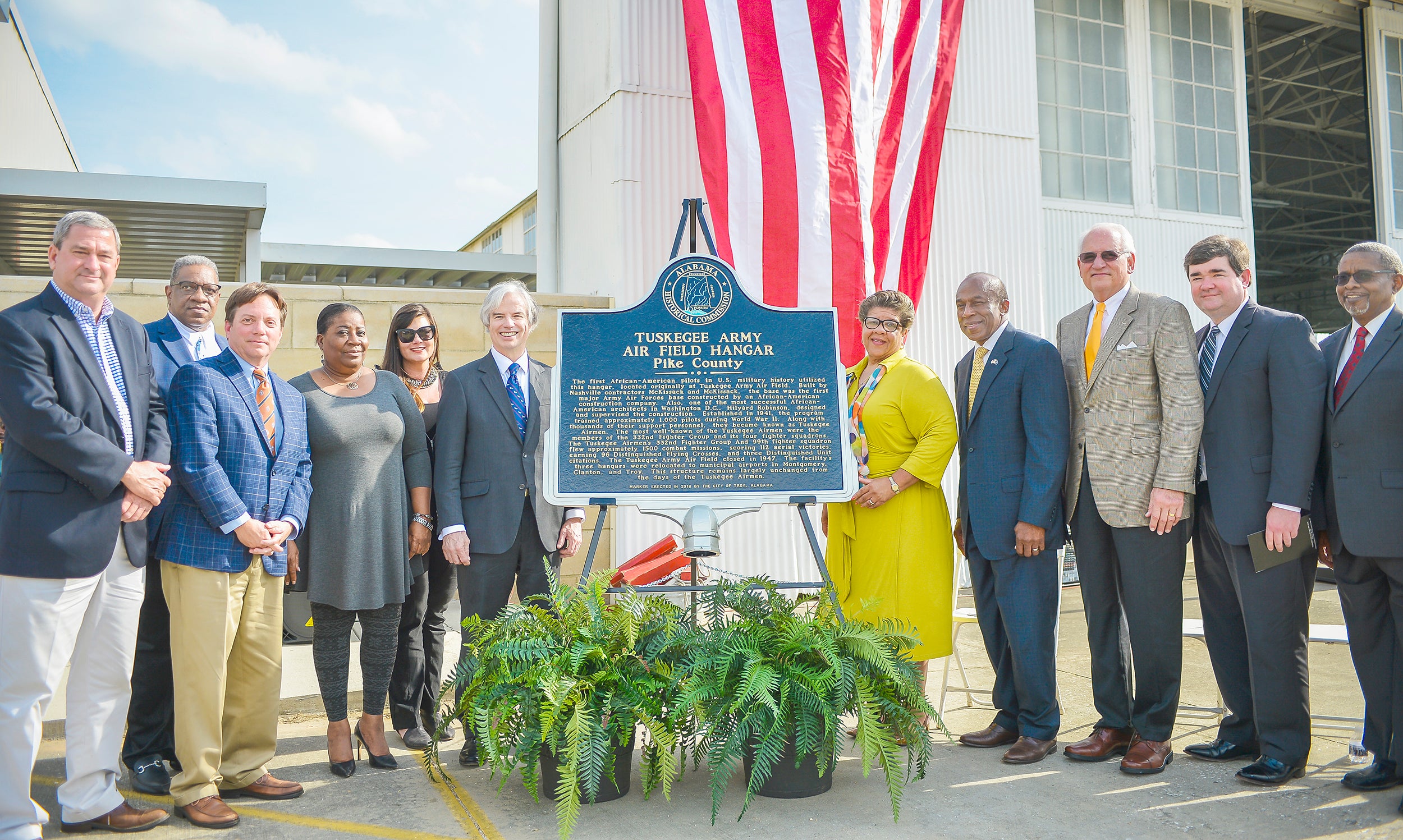HIGH HONOR: City of Troy celebrates Tuskegee Airmen with historical marker for hangar
Published 4:00 am Thursday, March 1, 2018

- Officials from the City of Troy and Troy University, as well as the daughter of one of the famous Tuskegee Airmen, gathered Wednesday to unveil a historical marker at the former Tuskegee Army Air Field hangar that now rests at the Troy Municipal Airport. The site is now officially on the register of historic places in Alabama. Above, officials pose for a group photo with the new marker. From left: Greg Meeks, District 2 councilman; Dr. Lamar P. Higgins, Troy University trustee; Marcus Paramore, council president; Wanda Moulty, District 5 councilwoman; Stephanie Baker, District 4 councilwoman; Maj. Gen. Walter Givhan, senior vice chancellor for economic development at Troy University; Sheron Rose, daughter of Tuskegee Airman Sherman Rose; Brig. Gen. Edward Crowell, Troy University trustee, Dr. Jack Hawkins Jr., Troy University chancellor; Mayor Jason Reeves and Robert Jones, District 1 councilman.
The City of Troy hosted the Tuskegee Army Airfield Hangar Historical Marker Unveiling Ceremony Wednesday afternoon at the Troy Airport.
The marker honors the Tuskegee Airmen who were the first black military aviators in the United States Army Air Corps, a precursor of the U.S. Air Force.
The hangar was originally a part of the Tuskegee Army Air Field in Tuskegee where the Tuskegee Airmen trained.
Maj. Gen. Walter Givhan, Troy University Senior Vice Chancellor, said the Tuskegee Airmen flew more than 15,000 missions during World War II and their impressive performance earned them more than 150 Distinguished Flying Crosses.
“The distinguished performance of the Tuskegee Airmen paved the way for the integration of the U.S. Air Force,” Givhan said.
The Tuskegee Airmen were young African American men who aspired to become pilots but had to overcome many obstacles including racism. At that time, racial segregation remained the rule in the U.S. armed forces.
Facing seemingly impossible odds, the Tuskegee Airmen were determined to realize their dreams to become aviators, said Brigadier General Edward Crowell, Troy University Trustee.
“These young airmen were proud individuals,” Crowell said. “They aspired to be aviators and they were determined to show they could fly. They seized the opportunity to excel.”
Crowell said the Tuskegee Airmen paved the way for the desegregation of the United States military “without thinking about it.”
“They put service before self and they accomplished their goals. They showed they could fly.”
Crowell said if the walls of the Tuskegee Army Airfield hanger could talk, what stories they could tell.
Sharon Rose, the daughter of Tuskegee Airman Sherman T. Rose said those stories would be of adversity and discrimination, of courage and commitment. Those stories would be of barriers and visions, of men who loved to fly.
She closed with Gillespie Magee’s “High Flight” that surely captured, in its closing lines, the feeling of a dream fulfilled by those who proudly wore the title Tuskegee Airmen:
“I’ve topped the wind-swept heights with easy grace; Where never lark or even eagle flew: And, while with silent lifting mind I’ve trod; The high untrespassed sanctity of space; Put out my hand, and touched the face of God.”
Lamar Higgins, Troy University Trustee, closed the program with heavenly thanks for opening doors to new opportunities and for closed doors that cause us to look to heaven.



